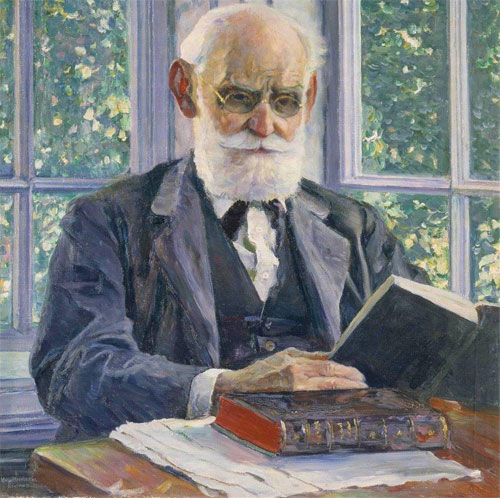The person who finds the law of reflection is conditional
Ivan Pavlov, who was dubbed 'the world's best physiologist', was born 165 years ago, on September 14, 1849, in Ryazan (Russia). He was the creator of the materialist theory of high-level neurological activity and received the Nobel Prize in Physiology and Medicine in 1904 for this creation.
Inspired by the progressive ideas of DJ Pisarev (famous Russian literary critic), after reading Charles Darwin's 'The Origin of Species' and the works of IM Sechnov (father of physiology studying Russia), Pavlov's Ivan Petrovich gave up his religious career to devote his life to science. And so later, the world has an outstanding physiologist.
Pavlov was born into a large family of priests. From a young age, Pavlov was an imaginative child, good at observing, having energy, persistence and patience in everything. These qualities helped Pavlov very much for later successful experiments.

Physiologist Ivan Pavlov
Like most of Ryazan's children, Pavlov began his studies at the church's school in Ryazan and later enrolled in a theological seminary. Pavlov is very giddy. At the age of 13, Pavlov read many famous works. Later Pavlov gradually became interested in the science of physiology.
In 1870, Pavlov decided to give up his theological studies and enrolled at Saint Petersburg University to study natural sciences and become a biologist. In 1875, Pavlov completed his course excellently and in 1879 he received a doctorate.
In the 1890s, Pavlov worked at the Institute of Experimental Medicine. Under his direction, the Institute became one of the most important centers for physiological research. Also here, Pavlov conducted most of his research on gastrointestinal physiology. With these studies, Pavlov paved the way for new advances in theoretical and practical medicine; At the same time, it shows that the nervous system contributes to regulating the digestive process.
One of his interesting and historical studies is about gastric secretion . We all know, when eating, the stomach releases a large amount of gastric juice to help digest food. With a determination to know how the brain was ordered, Pavlov experimented with a dog that had lived in the laboratory for many years, getting used to all the staff here.
He found that the dog's gastric juice greatly increased when they heard the footsteps of employees often bringing food to them. He thought the footsteps told the dog that the food was being brought, through the cerebral nerve, ordered to make the stomach produce gastric juice. From this discovery, Pavlov thinks that any signal such as a bell, whistling . associated with the appearance of food for a long period of time will produce similar results. He repeated this experiment many times. But this experiment only works for dogs who have been in the lab for a long time. As for new dogs, it is not possible. Pavlov thinks this is the kind of reaction to external stimulation. He called it 'conditioned reflexes'.

Mr. Pavlov found the "conditional reflex" law by studying the gastric function of dogs.
Later, Pavlov studied in depth the issues related to neurological activity such as: The work on circulation and nutritional effects of the nervous system; Experiments on the adaptive mechanism of blood vessels; Works on the activity of the digestive glands; Physiology of high-level neuronal activity - cerebral hemispheres; The doctrine of the neurological types of animals and humans; About sleep and hypnosis; Physiology and psychology in the study of high-level neurological activity of animals; About experimental pathology of advanced neurological activity.
Pavlov's research has opened up a new era in how to recognize the activity of the high-end nervous system, defeating idealism, willpower, laying the foundation for the development of medicine, veterinary medicine and training. practice habits for animals to serve people's will.
With a series of great works, Ivan Pavlov was awarded the Nobel Prize in Physiology and Medicine in 1904. In addition to the Nobel Prize, Ivan Pavlov was also elected a Fellow of the Russian Academy of Sciences in 1907; Honorary doctorate at Cambridge University in 1912 and was awarded the Royal Medal of Honor in 1915.
It can be said that, Pavlov spent his whole life in science, saying that 'the science required for each person must have a very urgent working spirit and great enthusiasm'. He died on February 27, 1936 in Leningrad (now Saint Petersburg). Until today, Pavlop is still referred to as a great scientist, an exemplary citizen of Russia.
- Science experiments that change the world (II)
- Dogs 'myths' in world history
- The mystery of the phenomenon of human reflection before dying
- Impressive cosmic scene of the week
- Bird flu spreads from person to person in China
- Thanks to the Falcon 9 rocket, American artists will release artwork that can be seen with the naked eye
- Decode the ability to turn the magic color of geckos
- Self-cleaning glass
- Cooler air due to bright roofs
- Warning for H7N9 flu can spread from person to person
- Illusion amazingly from soap bubbles
- The display is based on light reflection
 The most famous scientific failures in history
The most famous scientific failures in history Mysterious genius mechanic and the machine froze time
Mysterious genius mechanic and the machine froze time The son carries the 'bad gene' of genius Albert Einstein
The son carries the 'bad gene' of genius Albert Einstein Isaac Newton
Isaac Newton